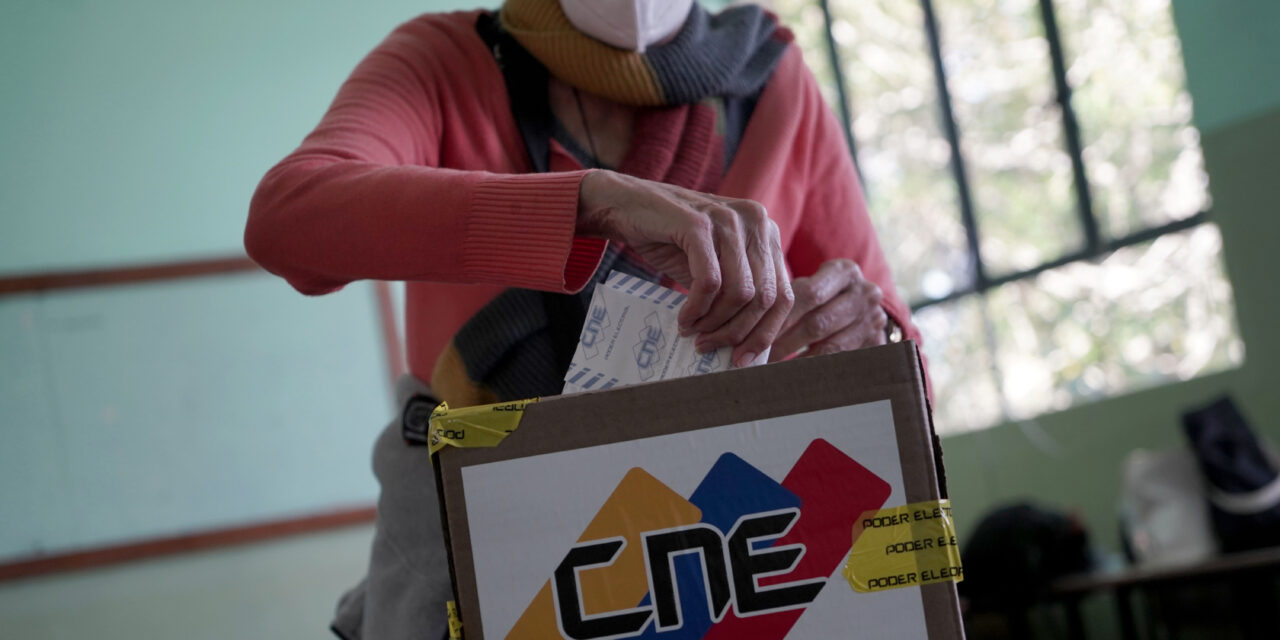Google Translate available in: Español
(Manaure Quintero/Getty Images)
The Venezuelan opposition is moving towards primaries to select a candidate for the 2024 presidential elections. As the parties search for a unified opposition candidate, there are still significant questions as to how these elections will happen, who can participate, and how they can be given a sense of legitimacy.
In February, the National Commission for the Primary Election in Venezuela announced that primaries will be held on October 22, 2023. Several opposition parties have already named their presidential candidates going into the primaries, including Carlos Prosperi for Acción Democrática, Andrés Velásquez for Causa Radical (better known as Causa Я), María Corina Machado for Vente Venezuela, Delsa Solórzano for Encuentro Ciudadano, César Pérez Vivas for Concertación Ciudadana, Henrique Capriles for Primero Justicia, and Manuel Rosales for Un Nuevo Tiempo. Benjamín Rausseo, a businessman and comedian, has also named himself as an independent candidate.
Voluntad Popular had initially confirmed Juan Guaidó as their candidate for primary elections in October. But his candidacy was thrown into question after he arrived in Colombia “on foot” attempting to meet with international delegations attending the Bogotá Summit about Venezuela’s political crisis hosted by Gustavo Petro on April 25. Guaidó was allegedly expelled hours later by Colombian officials for entering the country irregularly.
In a press conference following these events, Voluntad Popular expressed that they were assessing all options for a primary candidate, taking into consideration the persecution Guaidó and his family face from the Maduro government. But on May 5, Voluntad Popular finally announced Freddy Superlano as their candidate for the primaries, noting the difficulty Guaidó would have running a campaign from abroad and the dangers he faces in returning to the country.
While the 2024 elections are a crucial next-step towards democracy in Venezuela, there are still questions regarding how to ensure their validity and transparency. Civil society groups have called for international observation from the European Union, United Nations or others, to provide a level of scrutiny that could ensure some form of legitimacy for these elections. The EU observation mission in 2021 for regional and municipal elections in Venezuela provided a list of recommendations to improve electoral conditions. While those recommendations have yet to be addressed, they remain a priority in working towards free and fair elections. At the recent summit held in Bogota, the representatives of 19 countries and the European Union agreed on the importance of establishing an electoral calendar and implementing the 2021 EU Electoral Observation Mission recommendations.
Following the announcement of the primary elections, civil society groups have been working to secure the right to vote. Both inside and outside the country, many citizens are not registered with the Electoral Registry of the National Electoral Council. Venezuelan NGO Voto Joven estimates that about 3 million Venezuelan youth are not registered, due in part to obstacles such as the Venezuelan law requiring citizens to register in regional electoral offices located in the capitals of each of the 23 states. This requires time and resources that make the registration process inaccessible to many, especially those living in rural and border regions.
Of the roughly 7 million Venezuelans currently abroad, it is estimated that between 4 and 5 million are eligible to vote but not registered with the National Electoral Council (CNE). Many have migrated to countries such as Colombia, Peru, Chile, Argentina, Ecuador and the United States, however the CNE has yet to facilitate a process of registration for these Venezuelans abroad. The applicable legislation in Venezuela requires people to have a regular migratory status in the host country in order to vote, which promises to become another obstacle for the right to vote once the Electoral Registry opens in the Venezuelan consulates abroad, if it ever does.
The challenge is not only how to promote registration with the CNE, but also how to allow citizens to exercise their right to vote when many reside in countries that have no diplomatic relations with Venezuela, resulting in a lack of embassies or consulates to facilitate the actual voting process. Venezuelan civil society groups and activists have called for the facilitation of registration for Venezuelan citizens in the Electoral Registry, as well as conditions that allow Venezuelans to exercise their right to vote in presidential elections while abroad.
In addition, the recent approval of a draft of the Law of Supervision, Regularization, Performance and Financing of Non-Governmental and Related Organizations (Ley de Fiscalización, Regularización, Actuación y Financiamiento de las Organizaciones No Gubernamentales y Afines) in first discussion, has led to concern. This proposed law threatens to criminalize civil society organizations in Venezuela, as it would require them to seek authorization for their creation and ability to function in the country, subjecting them to fines and criminal charges if they continue to operate without approval. This is especially concerning during an electoral cycle, as it compromises the ability of civil society organizations to monitor electoral conditions and irregularities.



